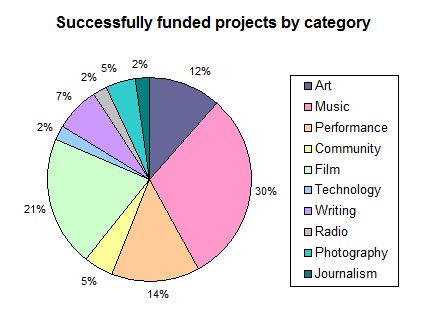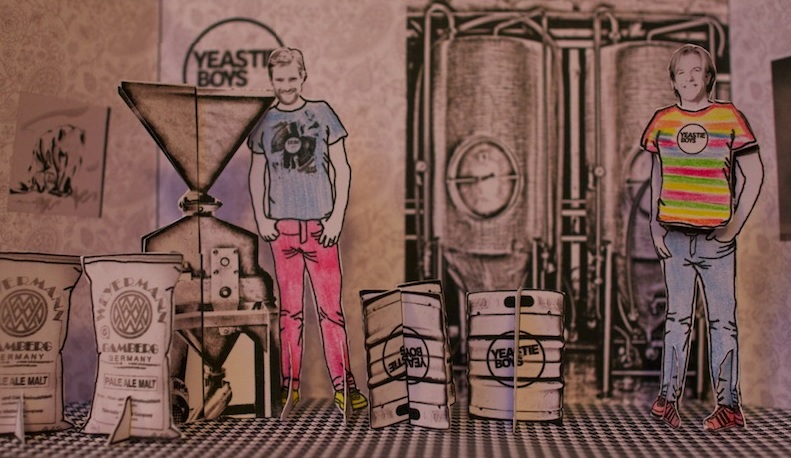When Amanda Palmer launched her music project via funding plaform Kickstarter in May of this year, her accompanying video declared “This is the future of music”. Palmer’s initial goal was to raise $100,000 towards her new record, art book and tour; she ended up raising over $1m. Palmer believes crowdfunding is where the recording industry is heading, she says “The music industry has long needed a new system and crowd-funding is it. The game is reversing – the media and the machine are following, rather than creating, the content.”
Crowdfunding is changing the rules for the music industry with fans now having the opportunity to become both consumers and investors; the latter traditionally carried out by record labels. In an industry affected by severe financial losses due to illegal downloads, the prospect of people actually paying for music is appealing. And in the case of established acts like Dresdon Doll-Palmer, the potential to generate revenue from your existing audience is huge.
So, what are the benefits for musicians? Primarily revenue and creative control.
Record labels typically take a slice of everything generated by an artist, including album sales, live shows and merchandise. Record distribution and promotion are additional costs that, once factored in, leave many musicians with a < 20% profit. Using a crowdfunding model, artists retain the rights to, and control of, their work, as well as a higher percentage of the profits.
OK, that all sounds good, but I wanna see stats! What are the success rates for fan-funded music projects?
Since April 2009, $38m has been pledged for music-related projects on Kickstarter. This makes music the second most successful category in terms of dollars pledged, after the film / video category. Last year, $19m was pledged in the music category, resulting in 3,653 successfully funded music projects, making music the most successful category on Kickstarter.
In the New Zealand neck of the woods, the music category has achieved the most success on PledgeMe, representing 25% of all dollars pledged. It is also the most successfully-funded category at 30% of all categories:
Wellington band St. Rupertsberg were the first successfully-funded music project – their goal was to raise $1,800 for their next EP, and set their campaign to run for 30 days. They met their goal in seven days and ended up raising $2,117. Read our interview with Kate Whelan, their singer and trumpeter, about her positive PledgeMe experience.
I’ve got a beard, a guitar, and a flannel shirt. I’m ready to launch. Let’s do this.
Settle down! There are a few things you need to do to increase your chances of funding that tour with the Fleet Foxes.
1. Identify and mobilise your existing fanbase. You will need a supportive audience to help spread the word and start pledging. If you don’t have an established group of followers, approach your family and friends for funding and word-of-mouth promotion.
2. Offer a range of rewards. You’re a music fan – what would you want in return from an artist? Be creative – offer both physical keepsakes (exclusive downloads; posters) and experiences (dinner with the band; an opportunity to “handclap” on the album). Ensure rewards are available for different budgets – i.e. anything from $1 to $500 (or more, if you’re feeling lucky).
3. Generate interest via social media. Use a variety of social media tools to establish and build a relationship with fans and potential pledgers. Services like Facebook and Twitter will allow you to build a relationship with your audience and post regular progress updates. Information can quickly and easily be spread far and wide, promoting your project and ensuring you remain top-of-mind amongst the crowd.
Crowdfunding for music projects requires work, but it can work. Whilst its greatest potential is with established artists that have a ready-built fanbase, as in Amanda Palmer’s case, it is also a business model with potential benefits for new and up-coming musicians.





Great article! I love the all that ultra-useful information that wraps it up.
Too bad I don’t have a beard… 🙂
Interesting to see the breakdown of industry that successfully gets funded. Good tips Trisha
Good stuff – I note that the comedian Louis CK made so much money through crowdsourcing subs to his last comedy special that he ended up giving a large portion away to charity.